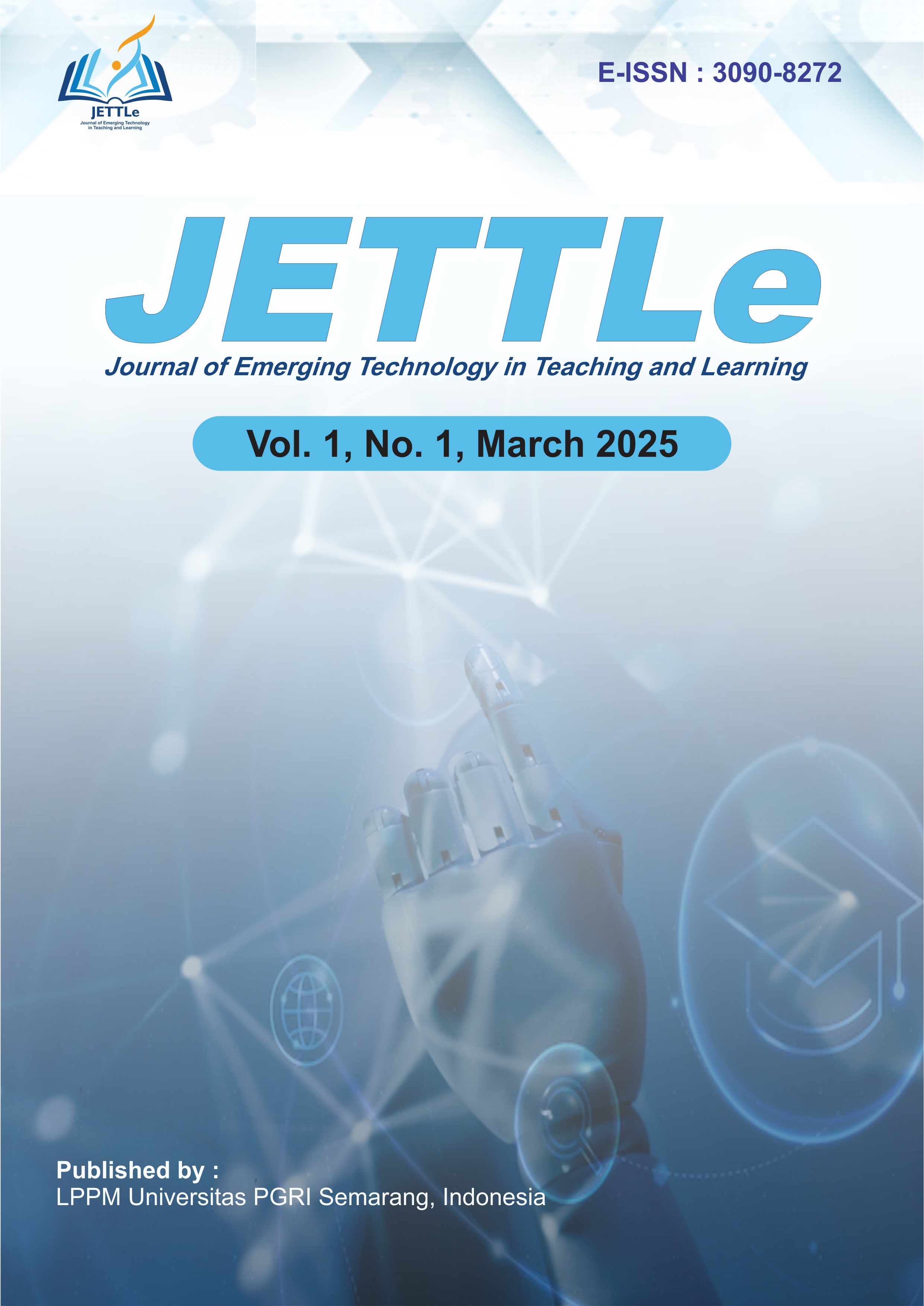Improving Project-Based Science Process Skills Through Learning Management System (LMS) for Science and Technology Courses
DOI:
https://doi.org/10.26877/jettle.v1i1.1770Keywords:
Science Process Skills, Project Based Learning, Learning Management System, StudentsAbstract
This study investigates the effectiveness of implementing project-based learning through the Learning Management System (LMS) in enhancing students' science process skills in the "Science and Technology" course. Employing a quasi-experimental pretest-posttest design, the research involved students from the elementary school teacher education study program at Universitas PGRI Semarang. The findings indicate a significant improvement in students' observation, experimentation, data analysis, and problem-solving skills after the implementation of project-based learning through LMS. These results highlight the potential of LMS as an effective learning model to enhance students' competencies in science and technology courses. This study benefits students, lecturers, higher education institutions, and researchers in education by providing insights into innovative teaching strategies that leverage digital learning platforms.
References
[1] Amanda, N. G., Biru, L. T., & Suryani, D. I. (2023). Pengaruh Model Pembelajaran Project Based Learning terhadap Keterampilan Proses Sains. PENDIPA Journal of Science Education, 7(1), 27922.
[2] Anderson, T., & Dron, J. (2011). Three generations of distance education pedagogy. The International Review of Research in Open and Distributed Learning, 12(3), 80-97.
[3] Chiappetta, E. L., & Koballa, T. R. (2010). Science instruction in the middle and secondary schools: Developing fundamental knowledge and skills. Pearson.
[4] Dianti, S. A. T., Pamelasari, S. D., & Hardianti, R. D. (2021). Penerapan Pembelajaran Berbasis Proyek dengan Pendekatan STEM terhadap Peningkatan Kemampuan Literasi Sains Siswa. Seminar Nasional Pendidikan IPA 2021, 432-437.
[5] Harlen W. The teaching of science in primary schools. Routledge; 2020.
[6] Hidayat R, Putri M, Setiawan D. The effectiveness of LMS-based learning in higher education. J Educ Technol. 2023;10(2):145-60.
[7] Means, B., Toyama, Y., Murphy, R., Bakia, M., & Jones, K. (2014). The effectiveness of online and blended learning: A meta-analysis of the empirical literature. Teachers College Record, 115(3), 1-47.
[8] Munir. (2010). Penggunaan Learning Management System (LMS) di Perguruan Tinggi: Studi Kasus di Universitas Pendidikan Indonesia. Cakrawala Pendidikan, 1(1), 111-118.
[9] Rezky R, Nugraha S, Dewi R. Enhancing science process skills through inquiry-based learning. J Sci Educ Res. 2021;8(3):87-102.
[10] Sari D, Wahyudi T, Priyono B. Integration of PBL and LMS in science learning: Impact on students' conceptual understanding. Int J STEM Educ. 2021;9(1):50-66.
[11] Subiyantoro, S., & Ismail. (2017). Dampak Learning Management System (LMS) pada Performa Akademik Mahasiswa di Perguruan Tinggi. Edudikara: Jurnal Pendidikan dan Pembelajaran, 2(4), 307-315.
[12] Sun L, Tang Y, Zuo M. Exploring the effectiveness of online learning in higher education: A meta-analysis. Educ Res Rev. 2020;31:100-17.
[13] Sun, J. C. Y., & Rueda, R. (2012). Situational interest, computer self-efficacy and self-regulation: Their impact on student engagement in distance education. British Journal of Educational Technology, 43(2), 191-204.
[14] Thomas JW. A review of research on project-based learning. Buck Institute for Education; 2019.
[15] Wismaningati, P., Nuswowati, M., Sulistyaningsih, T., & Eisdiantoro, S. (2019). Pengaruh Pembelajaran Berbasis Proyek untuk Melatihkan Keterampilan Proses Sains Mahasiswa. Pedagogia: Jurnal Pendidikan, 8(1), 1-14.
[16] Wulandari, O., & Tohir, A. (2024). Penggunaan Learning Management System (LMS) dalam Meningkatkan Kualitas Pembelajaran Daring di Perguruan Tinggi. Jurnal Review Pendidikan dan Pengajaran, 7(3), 31682.
Downloads
Published
Issue
Section
License
Copyright (c) 2025 Journal of Emerging Technology in Teaching and Learning (JETTLe)

This work is licensed under a Creative Commons Attribution-ShareAlike 4.0 International License.



